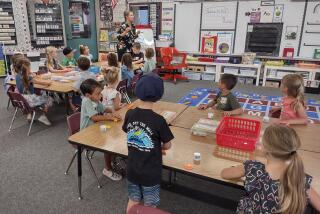ORANGE COUNTY VOICES / ANNEMARIE GARLIN : Delaying the Educational Journey to Save a Buck
Five years ago, hospital delivery rooms were full of babies who would debut as the “Kindergarten Class of 1992-93.” Many parents began then to prepare those children for school. One can surely then imagine the Richter scale recording when Gov. Pete Wilson announced last spring that kindergarten would be closed to all children born after Sept. 1, 1987, three months sooner than the previous cutoff. The governor argued that delaying the entry date for kindergartners was an “educationally sound idea” because being older meant being better suited to start school. It also, coincidentally, would have saved the state millions of dollars. Fortunately, the plan was shelved for now.
The issue should not be one of students’ being ready for school, but of schools’ being ready for students. Children need to begin their educational journey at the earliest age possible.
Significant research indicates that the earlier students begin formal education, the greater their chance for success. The French understand this and offer preschool education at age 2 or 3. Other countries do likewise. If we want our students to be able to compete in an increasingly global society and come out on top, delaying school entry is not the answer.
Each day, 27 kindergartners enter my classroom. They range in age from 4 years, 9 months to 6 years, 3 months. Their ability levels are as varied as the colors of their new school clothes. Some have never used a pair of scissors, written their name or solved a puzzle. Others have been read to since they were toddlers and demonstrate an interest in reading. Their “school readiness” is not the result of a birth date, but rather a combination of many factors such as heredity, developmental history, home environment, and previous school experience.
The school-readiness issue has been debated for years. Do we delay school entry as long as possible so that children are older and therefore more ready to learn? Or, do we provide developmentally appropriate programs for children and get them into school as soon as possible?
Researchers and psychologists can present arguments to support either position. Consequently, well-meaning parents and educators are often confused and play it “safe” by excluding eligible, school-age children for another year. This hardly seems the right answer as our entire nation rallies to improve schools and require more of students, not less.
Teachers meet the needs of kindergartners by organizing classrooms into a “hands on” multi-sensory, multicultural learning environment. Here, students are actively engaged in a thinking, meaning-centered curriculum. Today, kindergarten promotes a risk-free environment and gives every child the opportunity to feel safe, valued and successful.
Kindergarten teachers are often asked to predict when a child is ready for school, and more specifically, ready to read. The acquisition of reading skills, when taught correctly, is as natural and unpredictable as other childhood developmental milestones such as learning to walk and talk. A child’s every effort should be praised and encouraged so that he or she has the heart to try again. That is why students should be given the opportunity to explore a “print rich” environment as early as possible. No one is pushing students to read before they are ready. We merely provide the optimum conditions for success.
Robert Fulghum’s bestseller, “Everything You Need to Know, You Learn in Kindergarten,” underscores the importance of kindergarten and its lifelong effects. As we look at the education of our youngest students, it is important to remember that we are in the midst of restructuring our schools to improve education. Our future depends on the success of our children. Please Gov. Wilson, don’t delay their educational journey.
More to Read
Sign up for Essential California
The most important California stories and recommendations in your inbox every morning.
You may occasionally receive promotional content from the Los Angeles Times.










